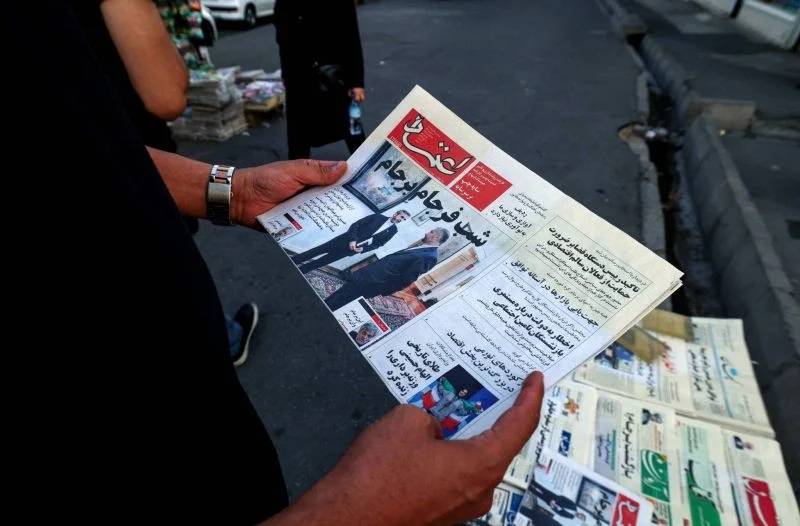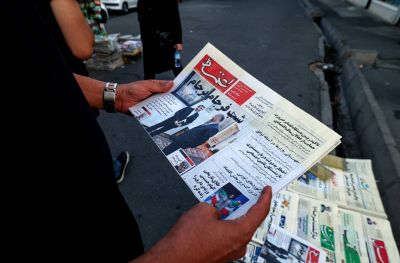
A man reads an Iranian newspaper headlining a possible solution to the nuclear issue. (Atta Kenare/AFP)
Not yet...but almost there. Despite some reservations, Iran seems ready to revive the 2015 deal monitoring its nuclear activity. Shortly before the deadline given by Brussels for Iran to respond, Tehran submitted its feedback on the draft, deemed a last-ditch attempt prepared by European negotiators.
Although the details of the response have not been leaked to the media, it seems for the moment that Tehran has given up a demand that Washington continues to be adamant about: removing the Islamic Revolutionary Guard Corps (IRGC) from the US terror list. In April, following doubts that he might be willing to do so, US President Joe Biden turned down this demand in a phone call with then-Israeli Prime Minister Naftali Bennett.
“Iran also appears to have dropped its latest condition that the IAEA give a date certain for the end of a probe into unexplained uranium particles at three sites in Iran,” Barbara Slavin, director of the Future of Iran Initiative at the Atlantic Council, told L’Orient-Le Jour.
This has been interpreted as a goodwill gesture, as in June Iran switched off surveillance cameras monitoring some of its nuclear sites. Tehran had anticipated an IAEA vote on a resolution criticizing its lack of cooperation.
On Monday, Iran’s Foreign Minister Hossein Amir-Abdollahian said he was expecting the White House, for its part, to exhibit “flexibility.”
During indirect talks between Washington and Tehran that have been going on for more than a year, Iran has so far used its usual tactics to gain time and leeway.
Nevertheless, after a five-month stalemate and overbids related to some Iranian demands and their rejection by the US, diplomats involved seem more optimistic than ever that a deal will soon be reached.
Despite the encouraging signs, a signature is not yet apparent, and some questions remain unanswered. For the time being, the Biden administration must coordinate with Europe to respond to the Iranian side’s remarks.
Point of contention
According to Iran’s official news agency, IRNA, “The US has expressed its verbal flexibility in two points of difference…But a third point is related to guaranteeing the continuation of the deal.”
While it anticipates a potential change in the US administration after the 2024 presidential election, Iran insists on this third point in order to avoid experiencing the same scenario as in 2018, when then-US president Trump declared withdrawal from the nuclear deal signed by his Democrat predecessor Barack Obama.
Under the US Constitution, however, Biden cannot guarantee that his successors will not do the same, even if Tehran continues to keep its end of the deal.
“Iran is still seeking some sort of guaranteed financial compensation if the US again pulls out of the deal while Iran is in compliance,” added Slavin from the Future of Iran Initiative.
Qatar, a preferred mediator between the two parties, sent its deputy foreign minister to Iran on Saturday in a bid to find common ground. The latter then had a conversation by phone with IAEA Director General Rafael Grossi.
There is no indication that the assassination attempt last week against author Salman Rushdie, against whom Ayatollah Khomeini issued a fatwa in 1989, may complicate the conclusion of the deal.
Iran has denied any link with Hadi Matar, Rushdie’s American attacker of Lebanese origin, who did not hide his ideological affinities with Iran and Hezbollah on social media.
The 24-year-old had direct contacts with members of the Revolutionary Guard, according to Vice News.
For more than a year, there have been talks about a return to the Iran nuclear deal, a key foreign policy objective of the Biden administration.
“The essence of the deal has not changed from 2015: Iran rolls back its nuclear advances in return for relief from nuclear-related sanctions,” said Slavin.
Just like the other signatories, Washington seeks to prevent Iran from acquiring an atomic bomb.
During his Middle East tour in mid-July, Biden increased pressure on Tehran by signing the US-Israel “Jerusalem Declaration,” thereby assuming the possibility of using force against Iran should the talks in Vienna fail.
The shadow war that has been waged between Israel and Iran for decades could thus turn into a direct confrontation, one that is feared by some of the White House allies, including Saudi Arabia and the United Arab Emirates, the top targets of the Iran-backed Houthi rebels in Yemen.
Western countries are also trying to avoid this scenario, as they strive to have the major oil and gas exporting countries increase their supply on the global market, to which Tehran could contribute.
This article was originally published in French at L'Orient-Le Jour. Translated by Joelle El Khouri.
